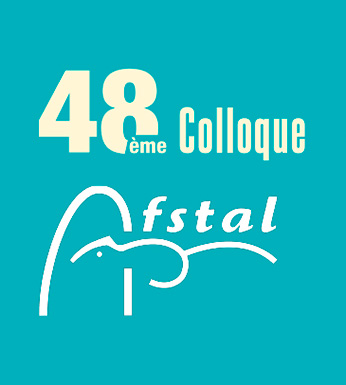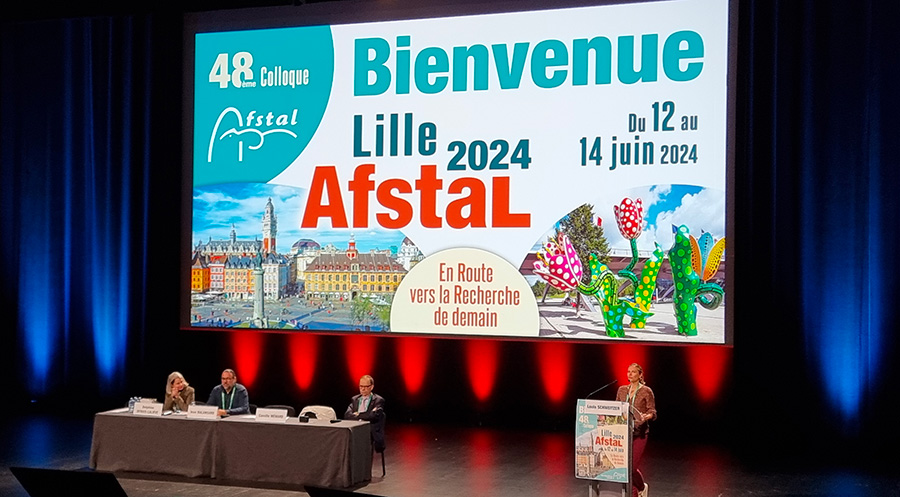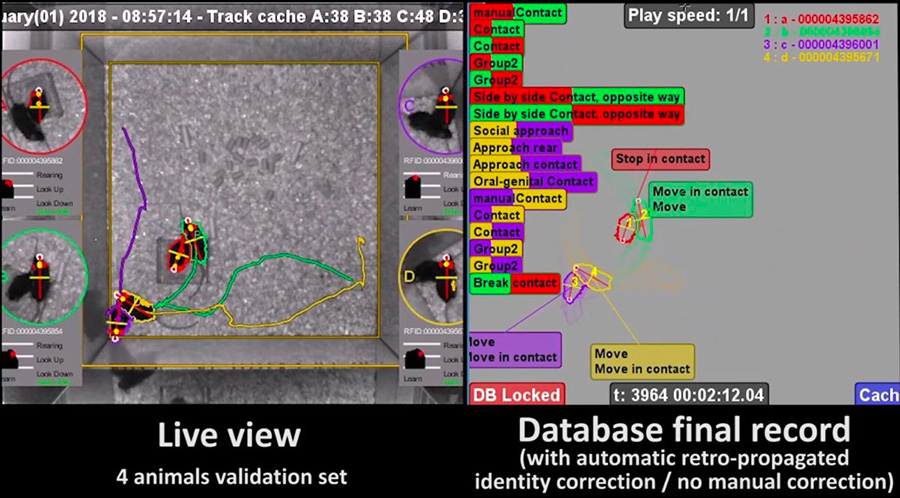

The next Afstal conference will be held in Nantes from 19 to 21 November 2025, focusing on “Animals and machines”.
The conference opened with an inaugural keynote presented by Louis Schweitzer, who exposed the challenges facing science and society and set the context for the 3Rs principle. His speech, praised for its broad perspective, emphasized the importance of the 3Rs and the GIS FC3R, of which he chairs the Advisory board/Think-tank (COR). Following this, 22 speakers addressed the evolution of the use of animals in research and the issues involved, through five thematic sessions. The speakers presented new technologies and alternative methods, highlighted the importance of data in science, and explained their relevance for the Replacement, Reduction and Refinement of animal use. The conference concluded on the societal challenges, reflecting the diversity of topics covered and their impact on tomorrow's research.

The role of AI in biomedical research: current state and future perspectives (Hugues Berry)
Hugues Berry, Director of Research at Inria, presented the current status of the use of artificial intelligence (AI) in research. AI, a computational system predicting an output of a real-world system based on given inputs, is widely used in biomedical research, particularly for data, such as image, analysis. Hugues Berry mentioned the strong interest in personalised models, such as digital twins (virtual equivalents that can simulate biological systems), which can be applied across various scales, from subcellular to whole organs. These models could Reduce the number of animals used in research. However, he pointed out that AI remains sensitive to biases, which are commonly present in biology. He illustrated this with an example of an AI designed to distinguish dogs from wolves, which sometimes mistakenly identify wolves by associating them with snowy landscapes.
Principles and challenges of Open Science (Audrey Legendre)
Audrey Legendre, Deputy Head of the Knowledge Sharing and Archives Department at the Institute for Radiation Protection and Nuclear Safety (IRSN), presented the principles and challenges of Open Science. This contemporary scientific approach aims to disseminate knowledge using digital means. Open Science ensure that scientific data, courses and software are accessible to all. It also involves setting up the necessary infrastructures and engaging various professionals such as technicians, doctoral students, researchers, publishers, IT specialists, and legal experts.
Audrey Legendre emphasized the importance of carefully selecting journals to avoid automatically transferring author rights to major publishers. She then detailed the concept of “open access” which allows free online access to publications at any time. She also recommended using the open digital archive HAL for international visibility and permanent indexing and archiving. Finally, she outlined key principles for “opening up” data (such as figures, texts, SOPs, etc.) by applying the FAIR (Findable, Accessible, Interoperable, Reusable) principles, and presented how to put these principles into practice when drawing up the data management plan, that is mandatory for any institution. Open sharing of publications and research data also facilitates the Reduction and Refinement of animal use for scientific purposes by, for example, preventing the duplication of previously conducted experiments.
Live Mouse Tracker & MiceCraft (Fabrice de Chaumont)
Fabrice de Chaumont, Research Engineer at the Institut Pasteur, captivatingly presented the development of his inventions, the Live Mouse Tracker and MiceCraft. He explained how the Live Mouse Tracker uses RGBD cameras (providing color and depth information), machine learning and RFID (radio-frequency identification) to study mice in real-time, in a rich environment and in groups, by tracking their movements and analysing their individual behaviours. The RGBD camera distinguishes individuals by depth, and RFID combined with machine learning allows individualized tracking, enabling to study mice in their environment and study their social interactions. His team used this method to study the effects of gene mutations (that are associated with autism) on mouse behaviors. The system accurately identifies mice, even when they overlap or nest together, and can distinguish, for example, a toy resembling a mouse from an actual mouse.
For further behavioral studies, Fabrice de Chaumont has also manually designed a “study box”, with several rooms and automatic doors that are safe for the mice. His team is studying various behaviours, such as collaboration (when two mice press simultaneously and each receives a reward) or generosity (when a mouse has the choice of receiving or giving a reward to a neighbour). These tools allow for Refinement by studying mice in an environment where they are freer and less stressed, also improving the robustness of the results.

Invertebrate Models - Drosophila and Other Insects (Carine Meignin)
Carine Meignin, Research Professor at the Institute of Molecular and Cell Biology (IBMC, CNRS - Unistra) presented her research, that focus on arthropods. She began by setting the scene, noting that invertebrates account for 95% of animal biomass - 42% being arthropods - while vertebrates make up only 5%. Meignin then discussed mosquitoes, known as formidable vectors of deadly human disease. She then delved into the research that are being carried out at the Strasbourg Insectarium, and in particular about their mosquito control strategy. These strategies include techniques such as the sterilisation of males released into the environment to reduce the survival of their reproductive eggs, as well as the use of “gene drive” genetic modification to decrease their disease transmission capability. The use of arthropods is also an approach to the “relative” Replacement of vertebrates by animals that are considered less sentient. With a link to actuality, her talk shed light on the challenges of arthropod research, their public health impact, and the reconsideration of scientific practices concerning these animals.
Future of Animal Research Work (Sébastien Mouret)
Sébastien Mouret, a sociologist at INRAE, underscored the ethical dilemmas (which he describes as “ethical suffering”) associated with working with animals, highlighting the tension between the moral aspects of respecting their well-being and the need to perform assigned tasks. To live well together with the animals they care for and “work” with, a number of notions were raised, such as the prospect of retirement and rehoming of animals. Sébastien Mouret also discussed compassion fatigue, a form of ethical suffering among people working with animals, stressing the risk of becoming desensitized to this suffering, which can affect mental health at work. To address these challenges, he proposed adopting a “culture of care” extending beyond the 3Rs, in order to create a virtuous circle between animal welfare and the staff well-being.
Posters and oral communications
Delphine Roussel was awarded the prize for the best oral communication on the « Impact de la méthode de perfusion intracardiaque chez la souris pour des analyses d'histologie et d'électrophysiologie » (Impact of the intracardiac perfusion method in mice for histological and electrophysiological analyses). The presented study demonstrated that post-mortem intracardiac perfusion is a reliable method for obtaining quality brain samples for various analyses, thus ensuring Refinement in animal use.
The FC3R at the conference
The FC3R had the privilege of being represented twice during the conference:
Marc Le Bert presented the Shorts Notes platform, which allows sharing unpublished results, whether positive or negative, in the form of short articles written in English and reviewed by experts based solely on the quality of experimental design, writing, and data presentation, not on novelty or scientific interest. These Short Notes are efficiently indexed and can be visible and cited - on HAL and on the FC3R website - thanks to the attribution of a Digital Object Identifier (DOI).
Athanassia Sotiropoulos shared her vision of the future of animal use for scientific purposes. Going through each stage of the experimental journey (from prospective to retrospective), Athanassia discussed future potential changes, such as the necessity of scientific justification for non-Replacement or severe procedures during ethical committee project evaluation, the introduction of mandatory pre-registration or the inclusion of other animals like insects in animal project authorization requests.
In conclusion, this year's topics reflect past, current and future developments in the use of animals for scientific purposes. They highlighted not only practices aimed at Refining and Reducing the use of animals, but also the prospects for evolution in terms of Replacement.
